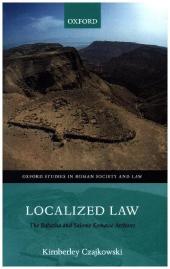 Neuerscheinungen 2017Stand: 2020-02-01 |
Schnellsuche
ISBN/Stichwort/Autor
|
Herderstraße 10
10625 Berlin
Tel.: 030 315 714 16
Fax 030 315 714 14
info@buchspektrum.de |

Kimberley Czajkowski
Localized Law
The Babatha and Salome Komaise Archives
2017. 256 p. 222 mm
Verlag/Jahr: OXFORD UNIVERSITY PRESS; OUP OXFORD 2017
ISBN: 0-19-877733-7 (0198777337)
Neue ISBN: 978-0-19-877733-5 (9780198777335)
Preis und Lieferzeit: Bitte klicken
Localized Law examines the legal archives of Babatha and Salome Komaise, which offer a window onto the practice of law in Maoza as it came under the control of the Roman Empire. A series of case studies of the various agents involved in the legal transactions illuminates the legal culture of this community and its practice of law and justice.
In the early second century CE, two Jewish women, Babatha and Salome Komaise, lived in the village of Maoza on the southern coast of the Dead Sea. This was first part of the Nabataean Kingdom, but came under direct Roman rule in 106 CE as part of the province of Roman Arabia. The archives these two women left behind not only provide a tantalizing glimpse into their legal lives and those of their families, but also offer a vivid window onto the ways in which the
inhabitants of this region interacted with their new rulers and how this affected the practice of law in this part of the Roman Empire.
The papers in these archives are remarkable in their legal diversity, detailing Babatha and Salome Komaise´s property and marriages, as well as their disputes. Nabataean, Roman, Greek, and Jewish legal elements are all in evidence, and are often combined within a single papyrus. As such, identifying the supposed ´operative law´ of the documents has proven a highly contentious task: scholarly advocates of each of these traditions have failed to reach any true consensus and there remains division
particularly between those who argue for a ´Roman´ versus a ´Jewish´ framework. Taking its lead from recent advances in the scholarship of Roman law, this volume proposes a change in focus: instead of attempting to identify the ´legal system´ behind the documents, it seeks instead to understand the´legal culture´ of the community that produced them. Through a series of case studies of the people involved in the creation of the papyri - the scribes, legal advisors, local arbitrators, Roman judges, and the litigants themselves - we can build up a picture of the ways in which they variously perceived and approached the legal transactions, and thus of legal practice itself as being heavily influenced by the particular agents involved. This study therefore moves away from a systematic
approach towards an historical study of ideas, attitudes, and perceptions of law, arguing that concentration on different agents´ understandings will ultimately help scholars to better understand the actual functioning of law and justice in this particular localized legal culture and in other similar small
communities in the Roman Empire.
Czajkowski has thus produced a reliable study which serves as an ideal introduction to a vital set of evidence. Antti Arjava, Journal of Roman Studies


